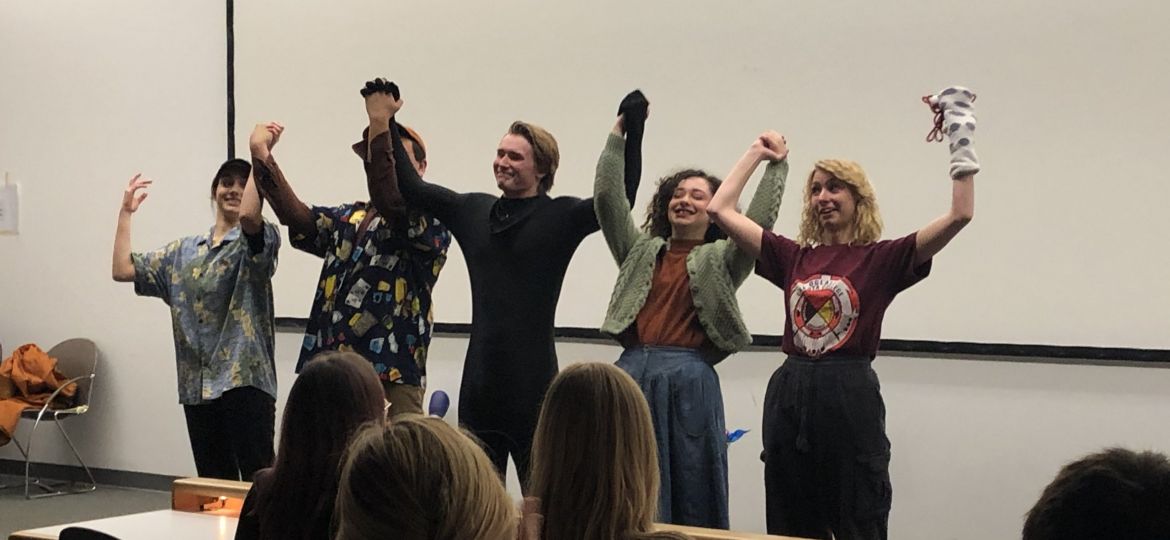
During the first weekend of November, two St. Olaf student-run theatre organizations collaborated to put on a show of original compositions.
Myswyken, led by Claire Chenoweth ’20, and Deep End, led by Cait McCkuskie ’20, collaborated on the event, Deepwykend Devising Festival. The Deepwykend theatre exhibition was a place for experimentation, thoughtful risk-taking and enthrallingly slick dialogue – which were at times rewarding and at others conflicting.
The display was built around three separate compositions. The first, “Red Moon Rising,” is the story of a heartbroken, unnamed protagonist and puppet companion Horus. They stumble into a small town where they unwittingly find themselves in the middle of the murderous attempted powergrab of Schmorg Washington.
I appreciated that the work was sprinkled with political references ranging from boomers to the opening NPR-esque allusion to dominant culture. However, I found the narrative dichotomy between the “bad” capitalist sycophant and the “good,” value-driven city-slickers who prove to be the messianic catalyst for change frustratingly simplistic given the real world framing. The witty cultural allusions and quality dialogue supported a promising but ultimately underdeveloped exercise in social reflection.
The second offering, “Common Things in Different Worlds,” was a classic tale of star-crossed lovers. Although treading familiar romcom waters, the treatment of the theme through a culturally non-English lense was refreshing. The piece felt rushed, which gave the offering an ease of viewability, but the density of the material being breached made it feel more pedantic than smooth. The abrupt ending left me no time to question implications of the characters’ choices and offered no resolution outside the usual platitudes of happy endings.
The last was the aptly named “Please Laugh” and was the standout offering in the selection. Five prisoners on death row in the Kingdom of Lordis must participate in a pre-execution ritual with the hopes of winning forgiveness from the ironically named “King Rupert, Conqueror of All.” It proved a fine consolidation of self-reflective dark humor. The performance of the entire cast was captivating. While it can be said that the selection of the characterizations bears no inherent meaning on the reasoning behind it, I wish the viewer was given more information with which to understand why those particular characters made sense in the plot’s context.
“Shock and awe” artistic expression is hit or miss. Taking humor as an example, shock lends itself to the kind of over-use that can often be read as an attempt to get a cheap laugh because the writer could not quite pull off the thread with as much wit as it took to set it up. I felt some of the performances strayed into that territory, leaning on gratuitous vulgarity to cap otherwise fascinating commentary. Within a community as highly concerned with inclusivity as St Olaf, limitations on available options to make a point can feel suffocating, but as the show itself demonstrated, those limitations should act as a motivator to invent new ways to elevate the expression.
Creation and originality are difficult to achieve, but the achievements of Deepwykend reflect the “diamond in the rough” motivational aim of the creatives. The output was good enough to warrant critical assessment to the point that I happily went twice. I encourage you all to look out for the work of St. Olaf’s pioneering student theatre organizations. The cast and crew of Deepwykend crafted a moment of exuberant expression.

